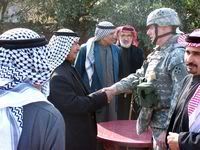When Americans Run Loose In Iraq
 Amidst all the rancorous squabbling brought to us courtesy of the anti-war Dems, we sometimes lose sight of the fact that our only hope to avoid a long-running war against radical Islam is to jerk the Gap nations like Iraq and Somalia out of their economic and human rights misery and welcome them to the enlightened world of the Core nations.
Amidst all the rancorous squabbling brought to us courtesy of the anti-war Dems, we sometimes lose sight of the fact that our only hope to avoid a long-running war against radical Islam is to jerk the Gap nations like Iraq and Somalia out of their economic and human rights misery and welcome them to the enlightened world of the Core nations.Fortunately, Americans on the ground in Iraq don't have to be reminded of this mission, as reported today by Nathan Ritzo in the Union Leader:
The best thing about my job on the Baghdad Provincial Reconstruction Team is seeing ideas become reality and make a positive impact. It's rewarding to visit places that have benefited from the ideas and hard work of American service members and civilians in Iraq and to see Iraqis adapt to their situation the Americans' example of dedication to national unity against the forces of terrorism and tyranny.
The reconciliation of Sunnis and Shi'ites across Iraq in a national movement to reject al-Qaeda is an example of this and was made possible by the troop surge. The reconciliation movement is evident in an area north of Baghdad called Taji. Tom Burke, the team leader for the Taji Embedded Provincial Reconstruction Team, or EPRT, calls this reconciliation the "Taji Awakening."
"(The Taji Awakening) involves all the sheiks (in Taji), both Sunni and Shi'a. Over the period of four weeks now, it has gathered momentum," Burke said. "The movement here has become dynamic."
He said that the largest gathering of Sunni and Shi'a sheiks in Iraq occurred on Aug. 20 in the Taji area and that the terrorist forces in the area are now "on the run" because of the sectarian reconciliation. As a result, the overall quality of life in rural North Baghdad Province has improved, with marketplaces "flourishing" and critical infrastructure needs being met, according to Burke.
Did this happen because Sunni and Shi'a in the Taji area just decided one day to drop their age-old relationships with each other and try something new. No, of course not. It happened because we toppled Saddam Hussein and have occupied Iraq in order to teach them a better way:
Col. Mike Bridges, who heads up the governance section of the EPRT, concurs with Burke that progress has been made, but specifies that the reconciliation starts at the local level. "It really did start with our brigade commander's philosophy in engaging the senior tribal sheiks," said Bridges. He added that the brigade commander tired of his soldiers getting hurt and of good local people being terrorized when they tried to make changes in their community. The changes in Taji began with a simple outreach program using fliers to promote the idea of Iraqi national unity against terrorism with the support of Americans.
There you go. One man, one American, making a difference, turning back centuries of habitual hatred and distrust by introducing the American principles of a free press and freedom of speech. A few fliers, a few conversations, and it's U.S. in and al-Qaeda out.
President Bush's adaptation of the Perturbance Princple laid out by Thomas Barnett and others can still turn out to be the crowning glory of his presidency ... if we are allowed to keep perturbing the powers that be in the Middle East. It is America's destiny to be the country that pokes world leaders in the eye with the branch of the tree of freedom, and Iraq is increasingly our evidence that this approach will work.
Photo: This Jan. 2006 photo shows Lt. Col. John Cross, the commander of 1st Special Troops Battalion, 1st Brigade Combat Team, 4th Infantry Division, greeting locals when the Army installed a new irrigation pump for a village in the Taji region -- a nice, positive little act of perturbance.
Labels: War in Iraq, War on Terror




<< Home